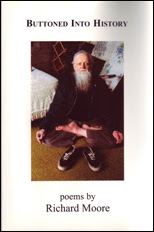
BUTTONED INTO HISTORY by Richard Moore
Pivot Press, 2006
$12.00 | ISBN 0-9726582-8-9
Reviewed by Eleanor Goodman
After William Carlos Williams and Wallace Stevens, after the advent of language poetry, post-language poetry, free verse confessional poetry and the prose poem, metrics have become dangerous territory. Most of the poetry being published today is unrhymed. Much of it lacks meter, or, some might argue, any rhythmic precision at all. (The work of Maxine Kumin and Richard Wilbur being among the major exceptions.) To our modern ear, blank verse has come to sound stilted, while trimeter and tetrameter remind us of nursery rhymes. Young poets chafe against the restrictions of rhyme schemes and the potentially deadening regularity of iambs.
Enter Richard Moore. Moore is not a young poet, nor is he afraid of traditional verse. “Buttoned Into History” is his eleventh book of poetry, and his energy shows no sign of flagging. These poems are fierce and pointed, but full of humor and intelligence. Almost all the poems are in rhyme, but for all the seeming formality, they feel loose, and at appropriate moments even slapdash. The greatest skill in employing poetic form is to make the strictures conform to the poem and not the reverse. Moore succeeds in this with surprise ease.
Notice the adroit use of feminine endings in the beginning stanza of “Politics”, one of the first poems in the book:
O it’s so dumb to mix
science with politics!
Our Parties think man’s curse is
various universes,
the way it all expands,
ordained, out of our hands.
Laborites think our fate
lies in the Steady State,
whereas the other gang
believes in the Big Bang.
Gutsy the lad who lives
with those Conservatives:
their cosmos mere erosion
after God’s mad explosion.
The unstressed last syllable in “curse is” / “universes” and “erosion” / “explosion” provide a welcome break to the singsong regularity of trimeter, and we know immediately that we are in experienced hands.
Politics is a major theme of the book. Moore is, to put it mildly, disenchanted with the current political scene. Here is the third section of “Three Little Money Songs”, with the heading “For the Inauguration of President Bush, the Second”:
Purchasing power, grab her, grasp,
and celebrate money’s last gasp.
Soon power naked – she’s a teaser –
will woo us. All Rome loved you, Caesar.
What else need be said?
When Moore’s topic ranges beyond politics, the poems seem to breathe a bit more, although he maintains his impressive formal technique throughout. One of the risks of rhymed verse is coming to rely too much on end-rhyme to create the music of the poem. Moore’s diction – ranging from the lowbrow (“soon we’re talking dirty”) to references to Sophocles and the great Ukrainian writer Gogol – occasionally does fall into flatness within a given line. When he strives for alliterative intensity, however, he achieves it – and how. His internal rhymes and assonance are reminiscent of the lamentably neglected poet Louis MacNeice, who could rewrite an insurance brochure and make it sparkle with linguistic ingenuity. Here is Moore’s gorgeous “Breakfast in Sussex”:
The sunlight splashes, fills
with glitter our tilled hills,
tractor-chopped, clipper-clipped,
and busy farmer-whipped,
their last ounce of production
sucked out by all that suction.
Our green mammary mounds
where sheep with soothing sounds
through hedge openings pass
like grains through an hourglass –
thus human life engages
the great machine, the ages;
and pulled to pieces...hush!
Breakfast is over. Brush,
as far as you are able,
metaphors off the table,
see what the world becomes.
A firmament of crumbs.
There is philosophical intensity in this as well. Without the glue of metaphor, into which all language inevitably degrades, the world crumbles. Language is a necessary screen over experience, a filter through which our thoughts travel into the world. But these thoughts themselves are metaphors, methods of interpretation. Without our constant self-talking, what world is left? What silence?
Moore’s poetry encourages such philosophizing. It encourages strong reaction, moments of aesthetic pleasure, moments of laughter. Moore accomplishes what all poets hope to accomplish with their work: he encourages us to be more human.
Eleanor Goodman/Ibbetson Update

